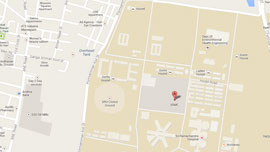Obesity Clinic
Nutrition and Obesity
An imbalance between the total calories consumed and the calorie spent in activity is the major cause
of obesity. Consuming calories more than what is expended gets accumulated in the body as fat tissue,
resulting in obesity. High calorie intake comes from the increased consumption of energy dense foods
that are high in sugar and fat. The current nutritional scenario is a “Nutrition Transition”where
healthy traditional diets are being replaced by modern high calorie, non nutrient dense diets. This
paradigm is stated by United Nations as “Food Swamps”- an abundance of high-calorie, low-nutrient,
processed foods and “Food Deserts” facing an absence of healthy food options.
Adding to this, increased physical inactivity, sedentary life style, due to changing modes of
transportation and rapid urbanization paves the way for overweight followed by obesity.
Dietary Management
A plethora of dietary management exists across population. Despite all these, the crucial strategy for
weight management lies only in reducing Dietary Energy Density, which has been scientifically proven to
be effective in weight loss and sustenance of lost weight. No magic/crash diets have been successful in
achieving either of these preferable outcomes.
Emphasizing portion control, and improving dietary quality is a central point in achieving sustainable
weight loss. These strategies coupled with behaviour therapy can effectively reduce weight under
continuous professional monitoring.
A variety of practical means and tools can help facilitate successful weight management by reducing
energy density by limiting energy intake from total fats and sugars; increasing consumption of fruit and
vegetables, as well as legumes, whole grains and nuts.
“Sustained adherence to a diet” rather than “following a certain type of diet” is the key to successful
weight management which can certainly prevent the prognosis leading to surgery.
Medical Nutrition Therapy and Bariatric Surgery
If, however, an individual had to undergo a Bariatric Surgery, it is essential to follow an appropriate
pre operative and a post operative dietary advice to continue to maintain a good health. Diet plays a
vital role before and after bariatric surgery. Previous studies have shown that adherence to a regular
nutritional follow-up contributes to post surgical weight reduction and prevents weight regain
Pre-operative weight management
Preoperative diets focus on “low-carbohydrate diet” than a “low-fat diet” with regard to short-term
weight loss, improvement in insulin sensitivity, and reduction in lipid concentrations. Various national
and international guidelines recommend an intake of 800–1000 kcals for a maximum of three months
pre-surgery. It is also essential to consider one multivitamin supplementation daily. Pre-operative
low-energy diets with supplemented micronutrients are expected to reduce liver size, making surgical
access and liver retraction easier. Impaired pre-surgery nutritional status is found to be related to
postoperative nutritional deficiencies and is associated with metabolic complications.
Postsurgery diet progression
Post surgically the patients are at risk of loss of lean muscle mass. Therefore, an adequate intake of
protein rich foods is to be emphasized and met, despite the reduced portion size of the foods, without
compromising other vital nutrients. Postoperative dietary recommendations are based on gradual
progression in food consistency and texture over 1 to 2 months. the post-surgery liquid diet is for 1–2
weeks, the soft/pureed diet for 2 weeks and solid food to begin only one month post-surgery. Timely
initiation of solid food ensures satiety and better nutritional composition in the diet. After two
months post surgery, patients can consume a regular balanced solid diet.
An individualized tailor made dietary management of the obese individual opting for bariatric surgery,
from a well trained Registered Dietitian, is essential to achieve a supervised and sustainable weight
loss.














